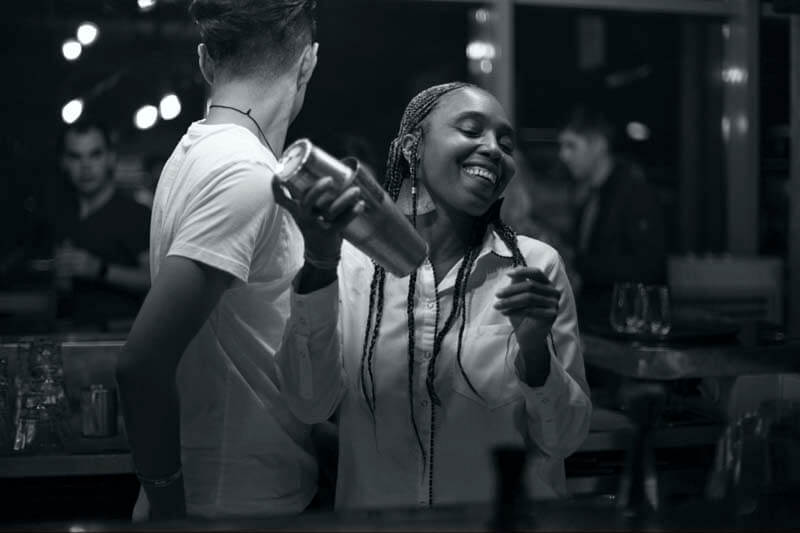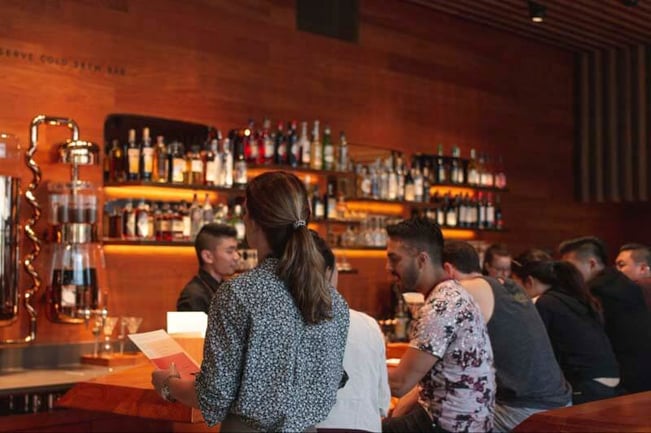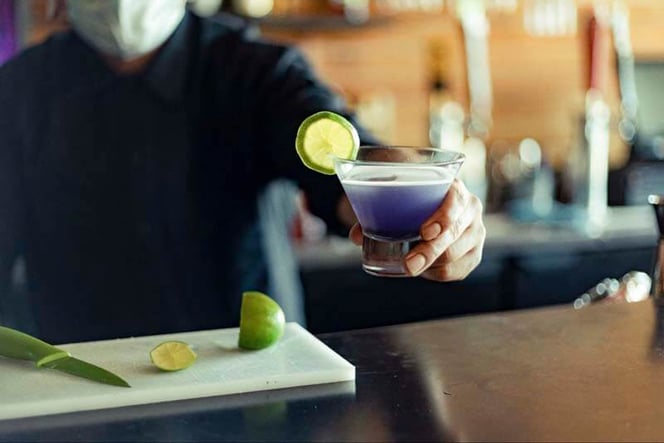Do I Need a License to Bartend and Serve Alcohol?

August 9, 2022

Whether you’re a high-end cocktail emporium, one of the best watering holes around the country, or a neighborhood bar, chances are your bartenders and servers are part of the beating heart of your team. Accordingly, you need to make sure that they have all the proper licenses or certificates required to legally serve alcoholic beverages. Does a bartender or server need a license to serve or sell alcohol?
So we dug into the details to help you understand what your bartenders and servers legally need in order to serve or sell alcohol across the country.
What We’ll Cover in This Piece:
What Is a Bartending License?

There are two types of bartending licenses.
First, those who complete bartending school will receive a bartender license. This type of bartending license shows that a bartender has taken courses on topics such as how to make drinks, how to perform bartending duties, etc.
But second and separate from the above definition, a bartending license is an official state- or municipal-issued document that shows a bartender has passed courses on responsible alcohol serving and awareness. This type of bartending license proves that a bartender or server has taken a state-approved course and understands the laws around selling and serving alcohol in their respective state.
Rather than focusing on how to mix drinks, these bartending licenses involve training on best practices from how to avoid overserving, preventing sales of alcohol to minors or intoxicated people, learning how alcohol affects the body, and practicing general alcohol awareness.
As a business owner, the latter definition is the most important here because this type of bartending license is the legal document needed to actually tend or serve alcohol based on local laws.
Now, here’s where it gets a little tricky. Each state (and sometimes county or city) has its own laws requiring bartenders or anyone serving alcohol to obtain certain licenses.
For example, in California as of July 1st, 2022, a bartender, server, waiter, or manager who serves alcohol is required to take and pass the California Responsible Beverage Service (RBS) Training Certification.
Receiving this bartending license will allow one to legally serve alcoholic beverages in the state of California.
These are mandatory, legal requirements that vary state by state, county to county, or sometimes even city to city.
Accordingly, you need to check with your local Alcohol Beverage Authority for the most up-to-date laws and consult with your lawyer to make sure that you are in compliance in your specific area.
Do Bartenders Need a License to Bartend?
The short answer: It depends where your bar is located.
While no national, formally recognized certification to bartend or serve alcohol exists in the United States, certain states do require your bartenders to pass courses concerning topics such as alcohol overconsumption and how to deal with inebriated customers or understand the basic laws regulating alcohol in your area.

As we mentioned, these legal requirements can vary by state, county, or even city.
For example, in Hawaii, serving alcohol is maintained by different counties. In other words, Honolulu has its own liquor commission and therefore its own requirements. All those serving alcohol in that city/county must take and pass a Server Training to obtain a “Liquor Card.”
And the state of California now requires all bartenders, servers, waiters, or managers who serve alcohol to take and pass the California RBS Training Certification.
On the other hand, in Florida, no legal requirement exists to obtain a bartending license.
You can see how the complexities of the system can get muddled pretty quickly.
Below, we’ve done our best to show you the requirements by state.*
What Are the Legal Requirements for a Bartender License in Each State?
Below, we’ve done our best to show you the requirements by state.* Simply click on the individual state's name to what the legal requirements are to serve alcohol.
* Please check your local Alcohol Beverage Authority for the most up-to-date laws in your area.
Alabama
Recommended, but not required except in specific circumstances
The Alabama ABC Board encourages that all employees involved in the management, sale, or service of alcoholic beverages pass the Responsible Vendor Program (RVP) training that covers Alabama law regarding the sale or service of alcohol, how to determine the legal age of a customer, civil and criminal penalties, and ways to mitigate risks associated with the sale and service of alcohol.
The program is mostly voluntary, but Alabama law does require mandatory participation for on-premises licensees who hold a retail restaurant license (020 license type). Additionally, any establishment that wants to hire 19- and 20-year-old servers must have those employees pass certification to serve alcohol.
Alaska
Required
The State of Alaska Alcoholic Beverage Control Board (ABC) requires all servers, supervisors, and security personnel handling sale and service of alcoholic beverages to take and pass the approved alcohol server training (there are a few approved options provided on the ABC website) no less than thirty days after joining an establishment.
Additionally, those employees must renew their alcohol server training certification every three years. And only people at or over 21 can serve alcohol.
Learn More: The State of Alaska Alcoholic Beverage Control Board
Arizona
Required based on employee position
In Arizona specifically, legal requirements are based on your position.
For instance, managers are required to obtain a license through what’s called Title 4 Training provided by the Arizona Department of Liquor License and Control (AZ DLLC).
On the other hand, servers are not required to take this training by state law. However, many Arizona establishments still require their employees to take the training just to cross their T’s and dot their I’s.
Learn More: Arizona Department of Liquor License and Control
Arkansas
Not required, but recommended
State law does not require one to take responsible alcohol server training. But many employers in Arkansas do require it because the Arkansas Alcoholic Beverage Control (ABC) Board looks at certification when handing out penalties and fines in the case an establishment does violate a liquor law.
For those looking to obtain a certification in Arkansas, they will need to pass a program called the Responsible Permittee Program. This state-certified course covers everything from the dangers of drunk driving to state laws on the sale and consumption of alcohol to ways to handle over-inebriated customers.
California
Required
As of July 1st, 2022, the state of California now requires that all bartenders, servers, waiters, or managers who serve alcohol take and pass the California RBS Training Certification.
All employees will be required to undertake this training by August 31st, 2022.
The training teaches employees how to responsibly serve alcoholic beverages on premise. New hires must complete the courses within sixty days of their first date of employment.
Learn More: California Department of Alcoholic Beverage Control (ABC)
Colorado
Not required
Colorado does not have a law that requires an employee to obtain certification to sell or serve alcohol.
But for those who do want their team to undergo training, the Colorado Department of Revenue provides a list of approved training programs.
Connecticut
Not required, but recommended
The Connecticut Liquor Control Commission recommends these state-approved training programs.
While not explicitly recommended, obtaining this certification is highly encouraged.
Be aware that some cities or counties in Connecticut may have stricter laws than the state.
Please check with your own city or county for the most up-to-date regulations.
Delaware
Required
Delaware state law requires that anyone in your establishment serving or selling alcohol must complete a state-approved alcohol server training.
This certification must be obtained within thirty days of your employee’s start date.
The state of Delaware has several approved training programs which you can find here.
Florida
Not required
Florida does not require official certification.
However, for businesses looking to train their employees as an added layer of insurance, they should have their team apply for the Florida Responsible Vendor Program.
Learn More: Florida Department of Business & Professional Regulation
Georgia
Not required, but recommended
The state of Georgia does not require those who serve or sell alcohol to obtain any license. And while it is highly encouraged to take part in a seller-server alcohol training program, the state does not provide any approved training programs. Instead, the state government says that “businesses are free to choose, adopt, or develop a training program with which they are comfortable.”
Hawaii
Depends on the jurisdiction where you work
Hawaii works a bit differently than many other states. Here, the counties regulate alcohol sales and service, meaning the laws and regulations differ from island to island.
In the City/County of Honolulu, the Honolulu Liquor Commission requires managers, assistant managers, and bartenders on Oahu to undergo a Server Training and Test. Once passed, the employee will receive a Liquor Card (or Certificate of Registration) color coded to designate position of authority in the establishment.
In Kauai County, the Kauai Department of Liquor Control only requires managers and assistant managers to pass a county-issued exam. Again, passing earns an employee a Liquor Card. Here, one must get a ‘red card’ to sell alcohol at off-premise establishments or a ‘blue card’ to serve alcohol at on-premise establishments.
In Maui County, the Maui Department of Liquor Control requires that only one person over the age of twenty-one in each business pass the alcohol server certification. In order to legally serve and sell alcohol, that person must be on premise during all hours of operation.
In Hawaii County, the Hawaii County Department of Liquor Control also requires that one person over the age of twenty-one in each business become certified.
Full details for each training and card system can be found on the county websites for Hawaii, Honolulu, Kauai, and Maui.
Learn More: Check your local county liquor control authority:
Idaho
Not required by state, but required in the City of Boise
Another slightly nuanced situation depending on where you are in Idaho.
The City of Boise requires that all alcohol servers complete an approved alcohol training course no later than sixty days after their hire date.
However, the state of Idaho does not presently have any requirements.
Illinois
Required
The state of Illinois requires all beverage sellers and servers to complete the Beverage Alcohol Sellers and Servers Education Training (BASSET).
Indiana
Required
Indiana state law requires anyone selling or serving alcohol to complete a seller/server training course approved by the Indiana Alcohol and Tobacco Commission (ATC) no later than 120 days after their hire date.
Once completed, the employee will receive an “Employee Permit” that allows them to sell and serve alcohol.
Iowa
Not required, voluntary
The state of Iowa does not require employees to undergo any alcohol server training certification.
However, for those businesses who do wish their team to train, the Iowa Alcoholic Beverages Division (ABD) provides a state-approved program called I-PACT.
Kansas
Not required, but recommended
The state of Kansas does not require employees to obtain any license or certification to serve or sell alcohol.
However, many business owners voluntarily require their employees to receive training because the Kansas Alcoholic Beverage Control (ABC) takes into consideration certification when dolling out penalties for legal violations.
Kentucky
No state requirements, but many mandatory local laws require training
Although no state-wide law requiring training exists, counties in Kentucky do have the right to make their own laws and regulations around selling and serving alcohol.
Check your local laws for more details.
And if you are looking for a training program for your staff, the Kentucky Alcoholic Beverage Control runs the Server Training in Alcohol Regulations (STAR).
Louisiana
Required
Any employee who serves or sells alcohol in the state of Louisiana must obtain a Louisiana RV Server Permit through a Louisiana Responsible Vendor Training no later than forty-five days after their hire date.
The Louisiana Office of Alcohol and Tobacco Control (ATC) provides a list of approved certification programs.
Learn More: Louisiana Office of Alcohol and Tobacco Control (ATC)
Maryland
Required based on position and city or county
While the state of Maryland highly encourages servers to take alcohol awareness training, it is not required, although Maryland MD Code, Alcoholic Beverages §3–504 does require at least one designated employee at the highest level of management to obtain a license.
Additionally, many alcohol selling and serving laws are regulated at the local level.
With that in mind, make sure you check your city or county laws to fully understand the certification needed for employees at your establishment.
Maine
Not required, but recommended
The state of Maine does not require alcohol server training. However, like several other states with similar recommendations, many Maine employers will still certify their team because the Maine Bureau of Alcoholic Beverages and Lottery Operations takes licenses into account when issuing legal violations.
Those establishments with certified servers can potentially receive mitigated penalties.
The Maine Bureau of Alcoholic Beverages and Lottery Operations provides a list of approved alcohol training programs here.
Learn More: The Maine Bureau of Alcoholic Beverages and Lottery Operations
Massachusetts
Not required
The state of Massachusetts does not require those selling or serving alcoholic beverages to undergo any specific training to obtain a license.
Learn More: Massachusetts Alcoholic Beverages Control Commission
Michigan
Required in certain situations
Things are a bit different in Michigan. Any on-premise licensees and their supervisory personnel must obtain certification from a program approved by the Michigan Liquor Control Commission.
Additionally, at least one certified supervisor must be present at each shift when your establishment serves alcohol.
Minnesota
Not required, but recommended
Although no state laws require your employees to complete a training program to serve and sell alcohol, it is highly recommended in Minnesota.
Again, it is important to note that in Minnesota some specific jurisdictions have stricter training requirements than others. Confirm with your city or county the exact laws you need to follow to be in compliance.
Learn More: Minnesota Department of Public Safety, Alcohol and Gambling Enforcement
Mississippi
Not required, but recommended
Although no state laws require your employees to complete a training program to serve and sell alcohol, it is recommended in Mississippi.
Again, it is important to note that certain cities or counties in Mississippi might have stricter requirements. Confirm with your city or county the exact laws you need to follow to be in compliance.
Missouri
Recommended, but not required unless in certain cities
No state laws exist in Missouri requiring a license for those serving and selling alcohol. However, certain cities do have mandatory training laws including: Branson, Cape Girardeau, Columbia, and St. Joseph.
Double check with your local city or county law to make sure that your business is in compliance.
Learn More: Missouri Department of Public Safety, Alcohol and Tobacco Control
Montana
Required
In Montana, anyone who wants to serve or sell alcoholic beverages must complete a course run by either the state, a Montana-certified trainer, or a Montana-approved training provider.
An employee must complete one of these training programs within sixty days of their hire date.
Nebraska
Depends on the jurisdiction where you work
No state laws exist that require someone serving or selling alcohol to take a training program. Having said that, the state of Nebraska highly recommends all those working in the hospitality industry to go through an alcohol server-seller training course.
Additionally, there are certain cities and counties in Nebraska that do require approved training including the City of Lincoln, the City of Kearney, the City of Ogallala, Nebraska City/Otoe County, and the City of North Platte.
In Nebraska, double-check with your local city or county law to make sure that your business is in compliance.
Lastly, even if you work outside of one of these jurisdictions, the Nebraska Liquor Control Commission (LCC) may require training after a liquor law violation.
Nevada
Required
In Nevada, anyone who serves or sells alcohol in a business with a liquor license must complete a state-approved training program within thirty days of being hired. After passing one of these courses, one will receive a Nevada alcohol education card good for four years.
New Hampshire
Required for managers; recommended for servers
New Hampshire approaches a legal policy to serve and sell alcohol based on position.
For example, the New Hampshire Liquor Commission (NHLC) requires designated managers to complete a Management Training Seminar (MTS) no later than forty-five days after licensing.
However, this requirement does not carry over to servers and bartenders; although, many establishments will still sign up their team for responsible alcohol seller-server training, because if a violation does occur, the NHLC may mitigate punishment due to appropriate certification.
At this time, New Hampshire does not have a list of approved training programs.
New Jersey
Not required, but recommended
The state of New Jersey does not have any laws in place requiring training for those selling or serving alcohol.
Like many other states though, employers often require their crew to obtain certification through an alcohol awareness program because those licenses may be a mitigating factor to the New Jersey Division of Alcoholic Beverage Control if a business does violate a law.
At this time, New Jersey does not have a list of approved training programs.
Learn More: New Jersey Division of Alcoholic Beverage Control
New Mexico
Required
Those who wish to legally sell or serve alcohol in the state of New Mexico must obtain an alcohol server permit. This type of certification is earned through a state-approved alcohol training program.
Once attained, the alcohol server permit must be kept by an employer on premises at all times.
New York
Not required, but recommended
No state law exists that requires one selling or serving alcohol to obtain a license through an approved course.
However, the state government does highly recommend employers go through training approved by the New York State Liquor Authority (NYSLA) such as TIPS or the Alcohol Training Awareness Program (ATAP).
And many business owners will require their employees to go through the ATAP program because the NYSLA reduces penalties for those establishments whose employees have valid ATAP certification.
Penalties may be reduced up to twenty-five percent if the violating employee can show proof of training no later than ninety days after the offense, according to NY ABC § 65.6 & 65.7.
North Carolina
Required for business owners; not required for servers
This is an interesting case. In North Carolina, business owners (i.e. anyone applying for an ABC permit) must complete a training program approved by the North Carolina Alcohol Beverage (ABC) Commission. It’s actually required that they show proof of completing the course on their ABC permit application.
However, anyone simply selling or serving alcoholic beverages is not required to obtain certification.
Learn More: North Carolina Alcoholic Beverage Control Commission
North Dakota
Depends on the jurisdiction where you work
State law does not require alcohol server training. However, certain local governments do, including Williston, Dickinson, Grand Forks, Fargo, Watford City, and West Fargo.
In North Dakota, it would be prudent to double-check with your local city or county law to make sure that your business is in compliance.
Additionally, many business owners still require their employees to undergo some type of alcohol awareness training. The reason being that in North Dakota first time violators will receive a mitigated punishment if they’ve taken an approved course.
Learn More: North Dakota Attorney General, Alcoholic Beverage Licensing
Ohio
Not required, but recommended
State law does not require alcohol awareness training for those serving or selling alcohol.
However, many business owners still require their employees to undergo some type of alcohol seller-server training because doing so could mean reduced punishment if someone does violate a law.
Under Chapter 4301.253 of the Ohio Liquor Control Law, a business owner may receive reduced punishment if the employee in violation has taken an alcohol training course in the following topics:
- The statutes and rules that govern the sale of beer, wine, mixed beverages, and intoxicating liquor
- How to prevent the illegal serving of beer, wine, mixed beverages, and intoxicating liquor to persons under 21
- Conflict management skills in alcohol-related situations
- Methods to safely evacuate the premises of a permit holder in an emergency
At this time, Ohio does not provide a list of approved training programs.
Oklahoma
Required
Since October 1st, 2018, the Oklahoma Alcoholic Beverage Laws Enforcement (ABLE) Commission requires every single employee to complete an approved training program.
The state of Oklahoma provides a list of approved server training programs here.
Oregon
Required
The first state to require mandatory training for anyone serving or working around alcohol, Oregon has slightly stricter regulations.
Anyone serving or selling alcohol in an on-premise location must get an Oregon Liquor Control Commission (OLCC) permit, issued after taking and passing a state-approved training program.
Pennsylvania
Required
Since 2016, the state of Pennsylvania has required that anyone selling or serving alcohol must complete a program run by the Pennsylvania Liquor Control Board (PLCB) known as the Responsible Alcohol Management Program.
This certification must be obtained no later than six months after an employee’s hire date.
Rhode Island
Required
Anyone on your staff who sells or serves alcohol in Rhode Island must take and pass an approved alcohol server training program no later than sixty days after starting work.
Learn More: Rhode Island Department of Business Regulation, Liquor Enforcement and Compliance
South Carolina
Not required, but recommended
State law does not require alcohol awareness training for those serving or selling alcohol in South Carolina.
However, many business owners still require their employees to undergo some type of alcohol seller-server training because doing so could mean reduced punishment if someone does violate a law.
The South Carolina Department of Revenue (DOR) Alcohol Beverage License (ABL) division considers it a “mitigating circumstance” when an employee can provide proof that they’ve passed an approved training course.
At this time, the DOR provides a list of recognized training programs here.
Learn More: South Carolina Department of Revenue, Alcohol Beverage Licensing
South Dakota
Not required, but recommended
State law does not require alcohol awareness training for those serving or selling alcohol in South Dakota.
However, many business owners still require their employees to undergo some type of alcohol seller-server training because doing so could mean a reduced penalty if someone does violate a law.
The South Dakota Department of Revenue (DOR) has the authority to deploy a different penalty schedule if the employee who violated a law has taken and passed a department-approved training program, according to SDCL (SD Codified Laws) 35-2-10.1.
Tennessee
Required, but the type of certification depends on your job and business
State law requires that anyone serving or selling alcohol pass alcohol awareness training.
However, in Tennessee, the type of certification depends on your job and establishment.
Here are the different types of permits required:
- Server Permit - required for anyone serving an alcoholic beverage in an establishment with an “On-Premise Consumption / Liquor By the Drink License.”
- Manager Permit - required for those in charge of the sale of alcohol, wine, and beer in a retail package or retail food store.
- Certified Clerk Status - required for those selling liquor, wine, or beer in a retail package or retail food store with a wine license.
Texas
Not required, but recommended
State law does not require alcohol awareness training for those serving or selling alcohol in Texas.
However, many business owners still require their employees to undergo some type of alcohol seller-server training because doing so could mean a reduced penalty if someone does violate a law.
The Texas Alcoholic Beverage Commission runs seller-service training programs that provide a Texas Alcohol Seller/server Certificate upon completion. You can take and complete the certification through these TABC Certification Schools.
Utah
Required
Utah requires anyone selling or serving alcohol to partake in mandatory alcohol training.
The state splits the type of training required into two categories: on-premise and off-premise.
Employees who serve alcohol in a business that offers these beverages to be consumed onsite (i.e. restaurants, bars, breweries, etc.) must complete on-premise server training.
Whereas employees who sell alcohol at establishments that offer these beverages to be consumed offsite (i.e. grocery stores, convenience stores, liquor stores, etc.) must complete the Eliminate Alcohol Sales to Youth (E.A.S.Y.) training.
Vermont
Required
Vermont requires that anyone serving or selling alcohol take part in mandatory alcohol awareness training.
The Vermont Department of Liquor Control (DLC) must approve any training courses such as the Vermont Alcohol Server Awareness Program (ASAP) Certification.
Virginia
Not required, but recommended
State law does not require alcohol awareness training for those serving or selling alcohol in Virginia.
However, many business owners still require their employees to undergo some type of alcohol seller-server training because doing so could mean a reduced penalty if someone does violate a law.
The Virginia Alcoholic Beverage Control (VA ABC) Authority may mitigate any suspensions or the size of a civil penalty if a business owner shows proof that the employee in question passed a state-approved alcohol server/selling training program, according to Code of Virginia (COV) 4.1-227.E.
The state-approved program in Virginia is called the Seller/Server Training Approval Program (STAP).
Washington
Required
In the state of Washington, if you serve alcohol at an on-premise location, you are required to complete the Washington State Mandatory Alcohol Server Training (MAST) from a state-certified training provider no later than sixty days after employment.
For those who sell alcohol in an off-premise location, you can take the voluntary Responsible Vendor Program (RVP), but it is not required.
Learn More: Washington State Liquor and Cannabis Board (WSLCB)
West Virginia
Not required, but recommended
No state laws exist in West Virginia requiring a license for those serving and selling alcohol. However, certain cities or counties might have stricter requirements.
In West Virginia, double-check with your local city or county law to make sure that your business is in compliance.
At this time, West Virginia does not have a state-approved list of training programs available.
Learn More: West Virginia Alcohol Beverage Control Administration
Wisconsin
Required
Anyone selling or serving alcohol in Wisconsin is required to pass the Responsible Beverage Server Training and get an operator’s license.
The Wisconsin Department of Revenue (DOR) has a list of approved training programs your employees can take.
Wyoming
Not required, but some cities and counties may require
No state laws exist in Wyoming requiring a license for those serving and selling alcohol. However, certain cities or counties might have stricter requirements.
For example, the City of Cheyenne requires bartenders to obtain an alcohol server certificate.
In Wyoming, double check with your local city or county law to make sure that your business is in compliance.
Additionally, many business owners still require their employees to undergo some type of alcohol seller-server training because doing so could mean that the The Wyoming Liquor Division (WLD) hands out a reduced penalty if someone does violate a law in Wyoming.
The WLD provides state-approved courses here.
Where Can You Find More Information on Bartending Licenses?

We understand that this topic can seem a bit overwhelming. And we’ve done our best to provide you with the requirements in each state. But these can change (as we see in California) and vary depending on where you are in your own state.
No matter where you are, we strongly recommend that you require all of your bartenders to take the local alcohol training and awareness certification. Even if your state does not legally require your bartenders to obtain a bartending license, it can only help your business to have your staff fully trained on best practices.
And please make sure that you check your local Alcohol Beverage Authority for the most up-to-date laws in your area.
With all this in mind, here are a few additional resources you can use to fully educate yourself on the topic of bartending licenses and what type of training your managers, servers, and bartenders need to be legally compliant in your state, country, or city.
Alcohol Beverage Authorities in United States, Canada, and Puerto Rico
TIPS, the global leader in alcohol server and seller - Scroll down the “State Laws & Regulations” section where you’ll find an interactive map. You can click on your state of choice to learn the laws and regulations in your area. Alternatively, you can go down to the bottom where you’ll see each state listed. Clicking on each state will provide incredibly helpful information including what is required in each state, approved programs, and the age to pour.
Unlock Your Beer and Beverage Potential!
More than 20,000 venues around the world use Untappd for Business for menus, analytics, and promotion of their venue.
Schedule a demo or start your 7 day free trial – no credit card required.
